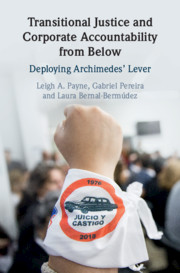Book contents
- Transitional Justice and Corporate Accountability from Below
- Transitional Justice and Corporate Accountability from Below
- Copyright page
- Contents
- Figures
- Tables
- Images
- Acknowledgments
- Introduction Transitional Justice and Corporate Accountability
- 1 Corporate Accountability from Below
- Part I Obstacles to Corporate Accountability
- Part II Accountability from Below
- Conclusion The Impact of Accountability from Below
- Appendices
- Bibliography
- Index
Conclusion - The Impact of Accountability from Below
Published online by Cambridge University Press: 10 April 2020
- Transitional Justice and Corporate Accountability from Below
- Transitional Justice and Corporate Accountability from Below
- Copyright page
- Contents
- Figures
- Tables
- Images
- Acknowledgments
- Introduction Transitional Justice and Corporate Accountability
- 1 Corporate Accountability from Below
- Part I Obstacles to Corporate Accountability
- Part II Accountability from Below
- Conclusion The Impact of Accountability from Below
- Appendices
- Bibliography
- Index
Summary
This concluding chapter summarizes the main arguments of the book regarding “justice from below.” It uses Archimedes’ statement– “Give me but one firm spot on which to stand, and I will move the earth”–as a way of understanding that process. The argument begins with weak actors: civil society and institutional innovators in the Global South. It shows how the dynamic processes underway in corporate accountability and transitional justice have depended on these two players. That is because they had the right tools to hold weighty businesses accountable. These include civil society mobilization and judicial action that combines local laws with international human rights laws.These weak actors with their tools have proved capable of lifting international human rights. They have done this in two ways. First, through their practices, they have begun to attend to victims’ rights to truth, justice, reparations, and guarantees to non-repetition. Second, they have identified business’s human rights obligations and found ways to enforce them. Although the book recognizes that systematic forms of accountability may be a long way off, it demonstrates that the right tools are in the right hands to be able to advance that process.
Keywords
- Type
- Chapter
- Information
- Transitional Justice and Corporate Accountability from BelowDeploying Archimedes' Lever, pp. 272 - 286Publisher: Cambridge University PressPrint publication year: 2020



